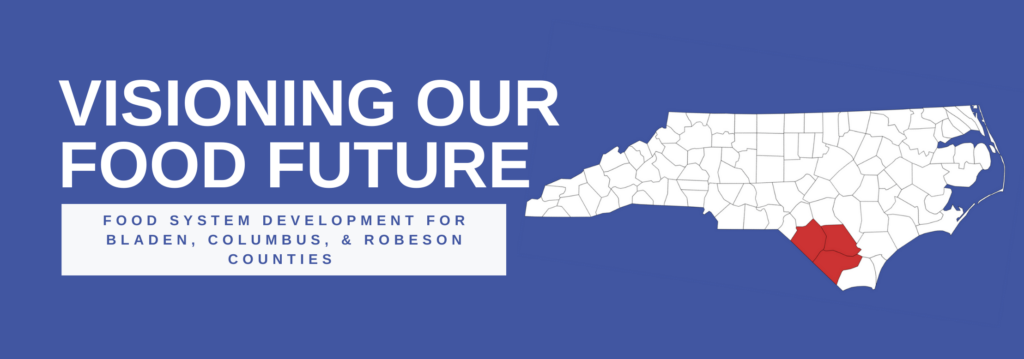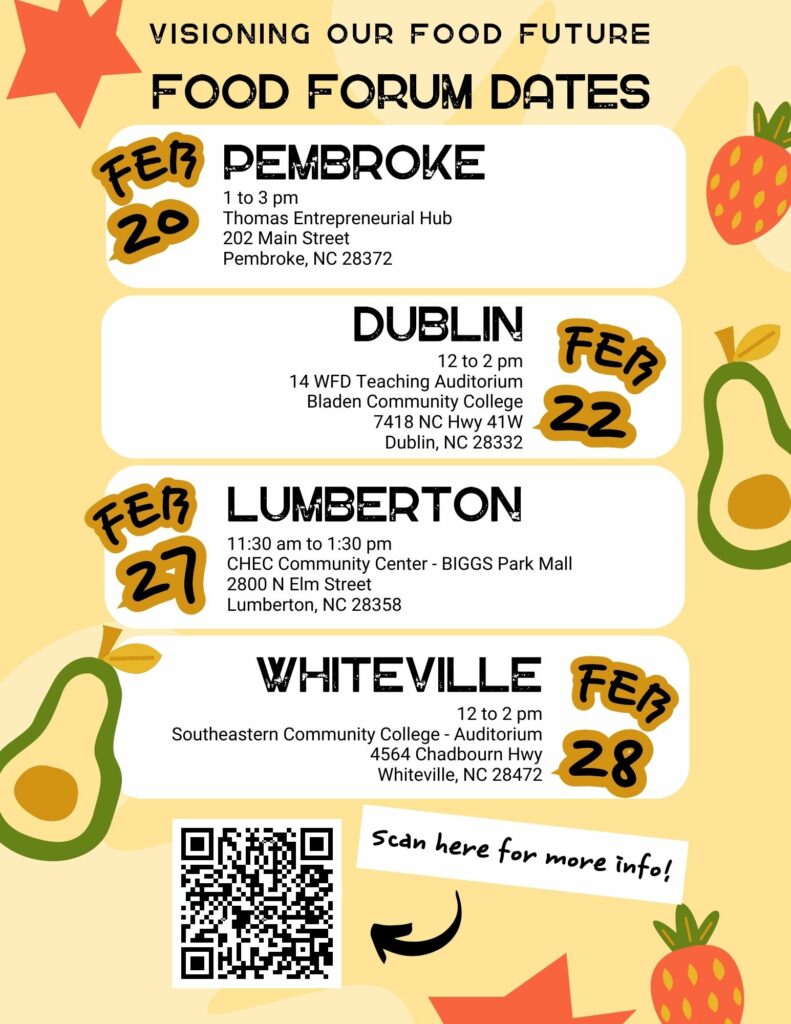Visioning Our Food Future
go.ncsu.edu/readext?868094
en Español / em Português
El inglés es el idioma de control de esta página. En la medida en que haya algún conflicto entre la traducción al inglés y la traducción, el inglés prevalece.
Al hacer clic en el enlace de traducción se activa un servicio de traducción gratuito para convertir la página al español. Al igual que con cualquier traducción por Internet, la conversión no es sensible al contexto y puede que no traduzca el texto en su significado original. NC State Extension no garantiza la exactitud del texto traducido. Por favor, tenga en cuenta que algunas aplicaciones y/o servicios pueden no funcionar como se espera cuando se traducen.
Português
Inglês é o idioma de controle desta página. Na medida que haja algum conflito entre o texto original em Inglês e a tradução, o Inglês prevalece.
Ao clicar no link de tradução, um serviço gratuito de tradução será ativado para converter a página para o Português. Como em qualquer tradução pela internet, a conversão não é sensivel ao contexto e pode não ocorrer a tradução para o significado orginal. O serviço de Extensão da Carolina do Norte (NC State Extension) não garante a exatidão do texto traduzido. Por favor, observe que algumas funções ou serviços podem não funcionar como esperado após a tradução.
English
English is the controlling language of this page. To the extent there is any conflict between the English text and the translation, English controls.
Clicking on the translation link activates a free translation service to convert the page to Spanish. As with any Internet translation, the conversion is not context-sensitive and may not translate the text to its original meaning. NC State Extension does not guarantee the accuracy of the translated text. Please note that some applications and/or services may not function as expected when translated.
Collapse ▲
Visioning Our Food Future (VOFF): Food System Development for Bladen, Columbus, & Robeson Counties.
About the Project
Community members in Bladen, Columbus, and Robeson counties are teaming up with a research and facilitation team from NC State University to create a food system assessment and plan for the region. Through this process community members will identify assets and challenges and prioritize actions that will guide future food system development. Taking the time to go through this process prioritizes equitable outcomes in food system development.
Over two years, community members across the three counties will provide insight, information, and goals for the local food system. The research and facilitation team will attend and host various events and opportunities to engage with the community to gather and report data and information. This team will create documents, maps, and other supporting resources that will be compiled into an assessment and plan for community members to approve.
This process is community-driven, meaning the community identifies the questions, data, and strategies. The research and facilitation team from NC State University will help guide the process and leverage our resources and knowledge to support the community. Our goal is that this process will support deep community relationships and collaboration and prioritize actions for future food system development that can sustain a thriving local food economy, with equitable access to healthy food for all.
Project Research and Facilitation Team
Members of the research and facilitation team are faculty and staff from N.C. Cooperative Extension, the Center for Environmental Farming Systems, and People-First Tourism Lab – who specialize in food systems, community engagement, and community development – with funding from the Kate B. Reynolds Charitable Trust. We are committed to place-based planning and development and will work under the guidance of community members, including a community-based advisory committee and local contractors. Our primary objective is to support farmers, food businesses, and community members in the region to develop a plan that will prioritize future work and prioritize funding needs for the community.

Stay Connected!
Fill out this google form for updates on the project and to sign up to participate on an Implementation Team, which will start Summer 2024!
Project Updates & Events
February Food Forums 2024 in Bladen, Columbus, and Robeson counties!
Over the last couple of years, the facilitation team at NC State have met with the project’s Community Advisory Committee and collected input from community members through meetings, Community Cafe events, surveys, and interviews to inform regional food system improvement strategies. Four February Food Forums are being held across the three counties for community members to review the draft strategic plan and build implementation teams around youth, workforce, food access, and entrepreneurship development. We look forward to seeing you there!
February Food Forum Dates:
Come when you can open house style events. Free food!
February 20th, 1-3 p.m., Pembroke: Thomas Entrepreneurial HUB, 202 Main St, Pembroke, NC
February 22nd, 12-2 p.m., Dublin: Bladen Community College, 7418 NC Hwy 41W, Dublin, NC
February 27th, 11:30 a.m.-1:30 p.m., Lumberton: CHEC Community Center – BIGGS Park Mall, 2800 N Elm St, Lumberton, NC
February 28th, 12-2 p.m., Whiteville: Southeastern Community College, Auditorium, 4564 Chadbourn Hwy, Whiteville, NC
Questions? Email Niesha Douglas, ndougla@ncsu.edu

Summer Interns 2023
Our Food System Internship for Summer 2023 is supporting three current community college, undergraduate, and graduate students to work with community partners in Bladen, Columbus, and Robeson Counties. The internship is hosted at a local food system business or organization based in each of these three counties and will include learning about micro-entrepreneurship development within the food system economy, storytelling as a method of community-based participatory, a tour of diverse agroecosystems across the state, networking with other food system interns and professionals, and multiple professional development opportunities. Learn more here: https://cefs.ncsu.edu/academics-and-education/internships/southeastern-nc-food-systems-overview/. For questions, please contact Niesha Douglas (ndougla@ncsu.edu; 919-515-5362).
VOFF Advisory Committee Established
Six food system partners from Bladen, Columbus, and Robeson Counties came together with the Research & Facilitation Team on November 28, 2022 to form an VOFF Advisory Committee for this project. The Committee advises on the 1) purpose and roles of the Advisory Committee, 3) food system internship, 4) food system strategic plan outcomes, 5) research protocol, and 6) strategies to engage and strengthen relationships with community members. The committee supports and represents the interests of the community within the project by co-creating the resulting community-based food system strategic plan and mobilization teams.
VOFF Advisory Committee members include:
- Cathy Hunt, Healthy People, Healthy Carolinas Grant Facilitator for UNC Health Southeastern (Robeson)
- Ed Hunt, Sustainable Agriculture Coordinator for Thomas Entrepreneurship Hub at the University of North Carolina at Pembroke (UNCP) (Robeson)
- Randolph Keaton, Executive Director of Men and Women United for Youth and Families (Columbus)
- Millard Locklear, New Ground Farm Owner/Operator and Manager of the Agriculture and Natural Resources Dept. for The Lumbee Tribe of North Carolina (Robeson)
- Kim Pevia, Founder and Principle of K.A.P. Inner Prizes (Robeson)
- Brielle Wright, Co-Owner of The Farmers B.A.G. (Bladen)
- Pamela Young-Jacobs, Vice Chief of Waccamaw Siouan Tribe and Director of Small Business Center Southeastern Community College and Regional Director of the SBCN Sandhills Region (Columbus)
More Information
Contact members of the research and facilitation team with questions or to learn more:
- Niesha Douglas (ndougla@ncsu.edu; 919-515-5362)
- Robyn Stout (rdstout@ncsu.edu; 919-515-5362)
- Hannah Dankbar (hcdankba@ncsu.edu; 919-515-1195)
- Duarte B. Morais (dbmorais@ncsu.edu; no phone)
- Dara Bloom (jdbloom@ncsu.edu; 919-515-8475)


